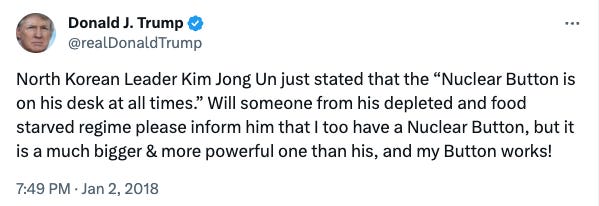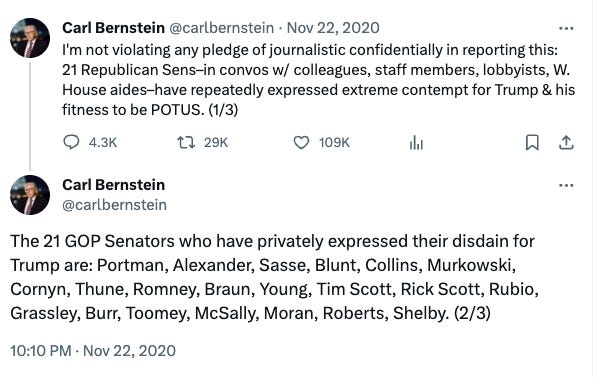Two related things happened on Tuesday morning:
Mike Johnson, the newly elected Speaker of the House, endorsed Donald Trump’s presidential campaign. “I’m all in for President Trump,” Johnson told CNBC. “I expect he’ll be our nominee, and we have to make Biden a one-term president.”
The New York Times reported on a Facebook post — written in 2015 — in which Johnson, then a state legislator in Louisiana, disparaged the idea of Trump as the Republican presidential nominee. “The thing about Donald Trump is that he lacks the character and the moral center we desperately need again in the White House,” Johnson wrote.
Whoops!
Johnson’s office tried to explain this all away as simply as misunderstanding.
In a lengthy statement to The New York Times on Monday night, Mr. Johnson said his comments were made before he personally knew Mr. Trump, and attributed them to the fact that “his style was very different than mine.”
He continued: “During his 2016 campaign, President Trump quickly won me and millions of my fellow Republicans over. When I got to know him personally shortly after we both arrived in Washington in 2017, I grew to appreciate the person that he is and the qualities about him that made him the extraordinary president that he was.”
Different styles! Didn’t know him well!
This is, of course, utter and complete bunk. For a bunch of reasons.
There is no evidence that Johnson, a low profile back bencher during his early years in Congress, and Trump had any sort of close personal relationship when they both came to Washington in early 2017.
Trump’s “style” — and the fact that it was different than Johnson’s — has zero to do with the substantive criticism the Louisianan was offering. Remember that Johnson said that Trump lacked the “character and moral center” the party needed. That is not a stylistic thing! Not at all!
What specific qualities did Johnson grow to appreciate about Trump? He doesn’t mention them. Surprise, surprise.
Actually, it’s worth digging a little more into that third point. Because the Times reported on more of what Johnson wrote about Trump back in 2015. And it’s remarkably prescient!
Here’s the key bit:
Challenged in the comments by someone defending Mr. Trump, Mr. Johnson responded: “I am afraid he would break more things than he fixes. He is a hot head by nature, and that is a dangerous trait to have in a Commander in Chief.”
Mr. Johnson, then a state lawmaker in Louisiana, also questioned what would happen if “he decided to bomb another head of state merely disrespecting him? I am only halfway kidding about this. I just don’t think he has the demeanor to be President.”
Yes! That’s exactly right!
Time and time again during his time in office, Trump showed that he was not just hotheaded but driven by personal vindictiveness and a desire for revenge.
As for Johnson’s contention that Trump could decide “to bomb another head of state merely disrespecting him.” I mean…..
Now, Trump didn’t bomb North Korea. But, still — Johnson was pretty damn close to the mark in his critique (and worry).
Look. This isn’t about Johnson and Trump having different “styles.” Or Johnson getting to know Trump personally.
The only thing that changed between when Johnson took to Facebook to raise the alarm about Trump and 2016 is that Trump won. And, after winning, demanded utter fealty — punishing those who wouldn’t offer it. To survive politically, Johnson reversed course on Trump and never looked back.
He’s far from alone in this, um, transformation. In fact, Johnson is in very good company.
I still remember covering the 2016 campaign for the Washington Post. I lost count of the number of Republicans — elected officials, senior staff etc. — who would roll their eyes when I mentioned Trump. At first they thought he couldn’t win. Then they worried he would. By the time they realized just how serious a threat he posed to the entire party, it was too late.
Carl Bernstein, he of “Watergate” fame, went public with this reality in a tweet two weeks after the election.
Most of the senators Bernstein named went public with their denials — insisting they had always been strong supporters of Trump.
But, Bernstein's account got some corroboration from inside the Senate chamber — in the form of Mitt Romney. In a very candid series of interviews with the Atlantic’s McKay Coppins, Romney effectively confirmed much of Bernstein’s reporting.
Perhaps Romney’s most surprising discovery upon entering the Senate was that his disgust with Trump was not unique among his Republican colleagues. “Almost without exception,” he told me, “they shared my view of the president.” In public, of course, they played their parts as Trump loyalists, often contorting themselves rhetorically to defend the president’s most indefensible behavior. But in private, they ridiculed his ignorance, rolled their eyes at his antics, and made incisive observations about his warped, toddlerlike psyche. Romney recalled one senior Republican senator frankly admitting, “He has none of the qualities you would want in a president, and all of the qualities you wouldn’t.”
This dissonance soon wore on Romney’s patience. Every time he publicly criticized Trump, it seemed, some Republican senator would smarmily sidle up to him in private and express solidarity. “I sure wish I could do what you do,” they’d say, or “Gosh, I wish I had the constituency you have,” and then they’d look at him expectantly, as if waiting for Romney to convey profound gratitude. This happened so often that he started keeping a tally; at one point, he told his staff that he’d had more than a dozen similar exchanges. He developed a go-to response for such occasions: “There are worse things than losing an election. Take it from somebody who knows.”
One afternoon in March 2019, Trump paid a visit to the Senate Republicans’ weekly caucus lunch. He was in a buoyant mood—two days earlier, the Justice Department had announced that the much-anticipated report from Special Counsel Robert Mueller failed to establish collusion between the Trump campaign and Russia during the 2016 election. As Romney later wrote in his journal, the president was met with a standing ovation fit for a conquering hero, and then launched into some rambling remarks. He talked about the so-called Russia hoax and relitigated the recent midterm elections and swung wildly from one tangent to another. He declared, somewhat implausibly, that the GOP would soon become “the party of health care.” The senators were respectful and attentive.
As soon as Trump left, Romney recalled, the Republican caucus burst into laughter.
So, yeah.
Make no mistake: This is political cowardice. And exactly the opposite of what we expect in leaders. Anyone can do the right thing when it is easy. Doing the right thing when it is hard is where true leaders distinguish themselves.
Johnson is just another Republican then who a) correctly saw Trump for exactly what he was early on and b) walked back that assessment and opinion when it became clear that Trump was winning (and had the backing of a significant chunk of the party base).
That capitulation allowed Trump to seize total control of the party’s levers of power. And now he is too powerful for anyone within the Republican party to stop him.
Remarkable.







I highly recommend Mark Leibovich's book Thank You For Your Servitude. It's infuriating.
Also, I don't think Trump will care about what Mike Johnson said. We've seen with JD Vance and Jenna Ellis, that you can say whatever you want, as long as you grovel for forgiveness.
Two things: 1) I blocked that troll, Yuri Bezmenov. Why do I still see his idiotic comments? He's not even a real person. The REAL Yuri Bezmenov died in 1993 (https://en.wikipedia.org/wiki/Yuri_Bezmenov).
2) The Republicans are now the party of Trump. They all bow before him. With the exception of Senator Romney and former Members of Congress Liz Cheney and Adam Kinzinger, none of them have a spine, or any moral compass whatsoever.